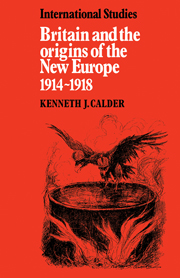Book contents
- Frontmatter
- Contents
- Dedication
- Acknowledgements
- Map
- Introduction
- 1 The initial contact
- 2 Yugoslavia in the Balkan negotiations, 1914–15
- 3 Espionage and propaganda, 1914–16
- 4 War aims, 1916
- 5 Britain and Austria-Hungary, 1917–18
- 6 The recognition of the Polish National Committee, 1917
- 7 Commitment by implication, 1918
- Conclusion
- Notes
- Bibliography
- Index
- Frontmatter
- Contents
- Dedication
- Acknowledgements
- Map
- Introduction
- 1 The initial contact
- 2 Yugoslavia in the Balkan negotiations, 1914–15
- 3 Espionage and propaganda, 1914–16
- 4 War aims, 1916
- 5 Britain and Austria-Hungary, 1917–18
- 6 The recognition of the Polish National Committee, 1917
- 7 Commitment by implication, 1918
- Conclusion
- Notes
- Bibliography
- Index
Summary
In August 1914 the British government knew little and cared less about the subject nationalities of eastern Europe. Everyone interested in European affairs knew of the Poles and probably possessed a rudimentary understanding of the Polish problem, but there is no evidence that the foreign office knew anything about the complexities of Polish politics. Serbian politics were better understood, because of the previous Balkan crises, but officials were not well informed about the Austrian South Slavs who were more often referred to as Bosnians, Serbo-Croatians, Croats, Slovenes and Serbs than as South Slavs; the term ‘Yugoslav’ was a novelty. The Bohemians or Czechs were known but very few had heard of the Slovaks; Czechoslovakia was not yet even a geographical expression. The government knew little of these nationalities because it was not interested in them and because it had no reason to be interested in them.
The British government entered the conflict in 1914 in order to maintain the existing balance of power in western Europe which would be upset either by the violation of Belgian neutrality or by the destruction of France as a great power. The Polish and Czechoslovak problems were totally irrelevant to the July crisis and to the actions of the British government. Although the crisis which precipitated the war stemmed originally from the South Slav problem, this was not a factor in the British decision to enter the conflict.
- Type
- Chapter
- Information
- Britain and the Origins of the New Europe 1914–1918 , pp. 214 - 219Publisher: Cambridge University PressPrint publication year: 1976



